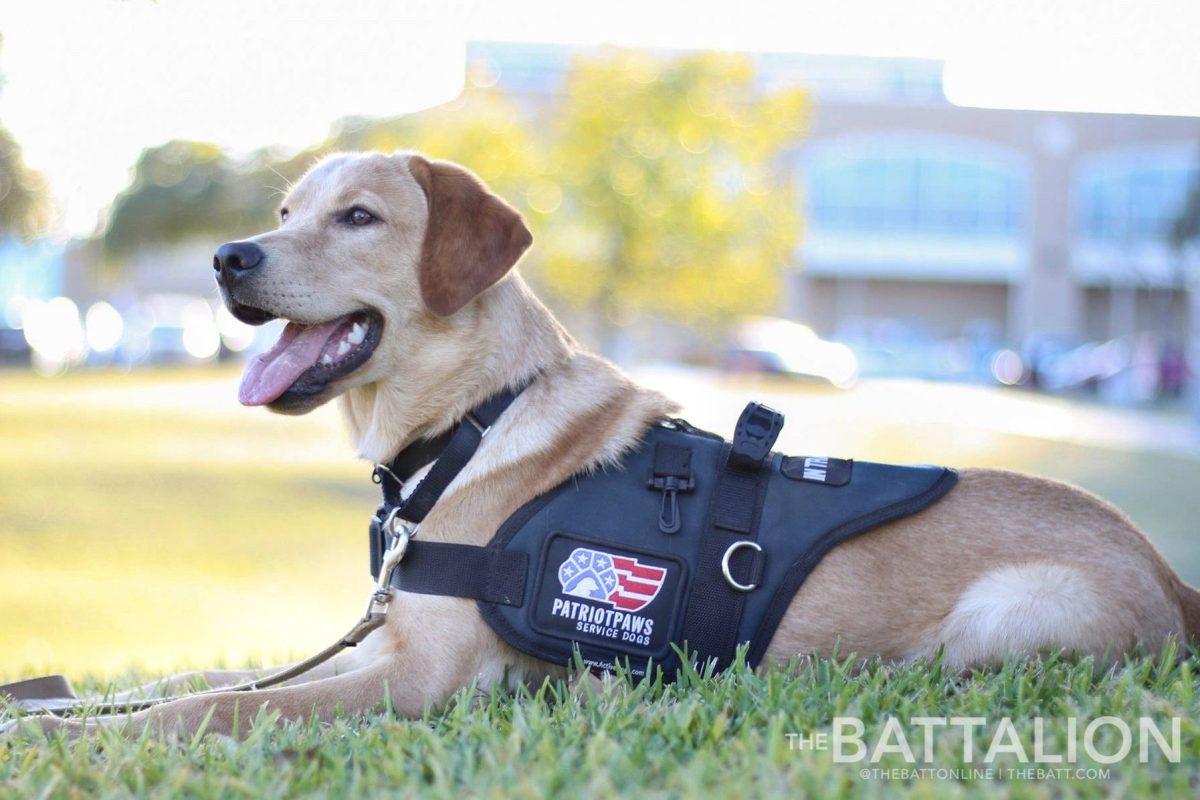While the dogs on campus may seem friendly and approachable, many of them are service animals and approaching them often impedes their ability to do their job.
Aiding their handler in everyday tasks is the job of service dogs, according to Kristie Orr, director of disability services for Texas A&M. Examples of service animals include seeing eye dogs, service dogs and autism assistance dogs.
“Any kind of dog can be a service animal,” Orr said. “The definition of a service animal is, ‘A dog has been individually trained to do work or perform tasks for an individual with a disability. The tasks performed by the dog must be directly related to the person’s disability.’ In some cases, a miniature horse can also be a service animal. No other animal can be a service animal.”
Orr said it is not always clear when a service dog is working, so people should never play with them in order to avoid accidentally interfering.
“Service animals should be assumed to be working and should not be approached,” Orr said. “If the service animal’s handler says that they are not working and you can pet the dog, you can. You should never knowingly interfere with a service animal that is working.”
Ashley McMeans, zoology sophomore, is a service dog handler and uses the services of her 100-pound Great Pyrenees, Nymeria, whenever she leaves home.
“I have had [Nymeria] for nearly two years, since she was just two months old,” McMeans said. “I try to find seating in classes where there is enough room for my service dog to lie down while also staying out of the way as much as possible. This includes avoidance of sitting in an aisle seat with my dog sprawled out in the walkway where anyone can trip over her.”
McMeans said while A&M is a largely service dog-friendly campus, she has faced uncomfortable situations.
“Overall I would say A&M is pretty friendly toward service dog handlers, but I do feel there is a bit of unintentional discrimination,” McMeans said. “It seems as if everywhere I go, there are people who want to stare, make noises at, talk to, pet, or take photos of my service dog. Most of these people do not understand that it is a crime to distract a service dog in any way due to the nature of its service, but this is something I face hundreds of times every single day.”
In addition to students interfering with her service dog, McMeans said she has also experienced other pet owners using their untrained dogs as emotional support animals to bring on campus.
“It is a crime to misrepresent a dog as a service dog,” McMeans said. “Professors force handlers and their service dogs to sit next to other dogs who are not service dogs. Misrepresentation of an animal as a service animal is a crime and is punishable in the state of Texas by a fine of $300 and 30 hours of community service. Texas A&M University in College Station, Texas, does not actually have a service dog policy, which I believe is, in part, why we have so many issues.”
McMeans said handlers who feel harassed can file a complaint with the Department of Disabilities on campus.
“Texas A&M’s Department of Disabilities is the primary resource for those who intend to file a complaint,” McMeans said. “However, they do not deal with the general student body, only faculty and heads of campus organizations. If there is an issue with a specific group or organization, the heads of these organizations can also be contacted to file a complaint.”
It is essential for people to behave around on-duty service dogs and treat the handlers like any other person, according to McMeans.
“As a disabled service dog handler, I would like to be treated with the same common courtesy given to ‘normal’ people,” McMeans said. “I am a normal person and I want to feel normal, not like I have my disability on display because I need a dog to help me. When people ask me about my dog, I feel like they are unintentionally discriminating against me, because those people would not be talking to me if I did not walk around campus with a dog.”
Putting their best paw forward
March 21, 2018
0
Donate to The Battalion
$2790
$5000
Contributed
Our Goal
Your donation will support the student journalists of Texas A&M University - College Station. Your contribution will allow us to purchase equipment and cover our annual website hosting costs, in addition to paying freelance staffers for their work, travel costs for coverage and more!
More to Discover










